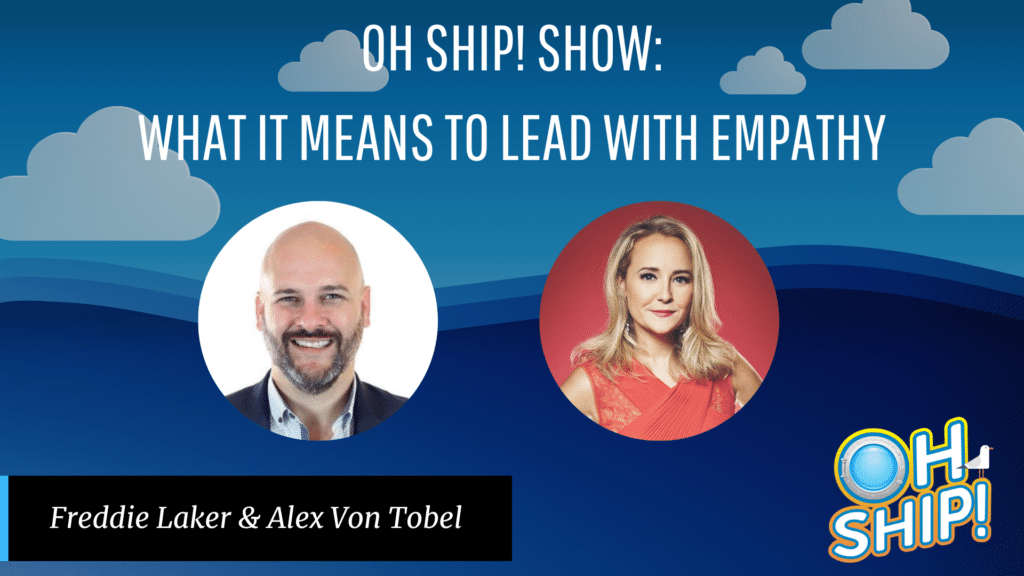Alexa drives home the importance of empathic leadership and a focus on process over outcomes as indispensable qualities.
Alexa von Tobel models empathy in her daily work with the companies she invests in and in her podcast, the Inc. Founders Project, where she talks with people from today’s leading technology companies. After achieving sweeping success in her early entrepreneurial career, she decided she wanted to help others bring their innovative ideas to fruition. And that’s how Inspired Capital was born. Read on to hear Alexa’s insights on enhancing your empathy for others and how it will help you flourish as a leader.

Why empathetic leaders are more successful
Alexa’s favorite word is “love”, and her second favorite is “hard work”. These two qualities go hand in hand in her efforts as an investor and champion of up-and-coming founders.
Showing love for others in the form of empathy is a prerequisite for good leadership, she says. “I think it’s really hard to be successful in life and have no empathy for others,” she explains. “Empathy simply is, you care about other people. People feel it. You have an emotional response to the well-being of another person. If you don’t have empathy, it’s really hard to go very far.”
Some people are exceptionally empathetic by nature, and others can work to enhance this quality. The pandemic has undoubtedly ramped up many people’s empathy levels. “We’ve all been through a lot through the last year. It’s really hard not to have empathy for a fellow human,” says Alexa.
She highlights several qualities empathetic leaders exude that will deepen and help demonstrate your innate empathy for others.
Taking big risks
While many people recoiled from the market collapse of 2008, Alexa saw an opportunity. Starting in tough times sharpens your abilities as a founder, she says. The disruption brings new ideas, plus there’s a lot of talent on the market.
“When I was dropping out of Harvard Business School, my classmates thought I was crazy,” she laughs. “It was quite terrifying to leave the warm cocoon of Harvard Business School where jobs are guaranteed, and you know where you’re going,” Alexa says. But she had to rely on her principles and conviction. “Not everybody can see the future that I can see, and I’m gonna go will that future into existence,” she told herself.
She’d already done the legwork, which gave her the confidence to launch. “I’d done my homework. I believed there was a clear path. I was committed to making it happen, I believed in the mission of our business […] and that was that” Alexa continues. “In the rearview mirror, everyone reveres how smart I was.”
She built up the company LearnVest, which offers personal financial planning software. After it sold for $375 million, an even bigger goal emerged: Building the venture fund that she wished had existed when she was a new entrepreneur.
Since then, Inspired Capital has built and scaled about ten different businesses. They’re comfortable with the complex challenges and that’s their favorite part of the work.
Alexa’s success has shown firsthand the importance of acting on a bold idea. “Consensus thinkers don’t tend to be exponential thinkers,” she asserts, meaning you can’t look for buy-in from everyone before you act. Moreover, taking risks means making yourself vulnerable inherently, which brings a deep sense of empathy for others experiencing the same hurdles, fears, and frustrations.
“You’ve gotta lead with vulnerability,” she emphasizes—and only by stepping outside of your comfort zone can you allow yourself to feel truly vulnerable.
Embracing failure
At its core, empathy means understanding and sharing another person’s feelings, which brings trust and establishes common ground. “Having experienced failure is key to being able to experience empathy,” asserts Freddie.
Alexa and her older brother joke that they’ve failed their way to the top. She also jokes that she gets punched in the face by failure many times a day and just keeps saying, “Next?”
“I’ve always found comfort in hard work,” she says. “There has been a long list of failures.” People are always shooting down ideas, potential investors are stepping back, things aren’t going as planned, and you just have to keep moving forward. At LearnVest, she had to cope with losing employees she loved without wallowing in frustration.
How does she cope so well with failures? “I don’t get validation from other people. I get validation from my work, from my actions,” Alexa says. “I’ve just recognized that the number one way to be successful is to dig in, lean in, and shoulder in and make lemons turn into lemonade.”
Creating psychological safety
Being an empathetic and vulnerable leader means recognizing that you don’t know everything, Alexa says. “When I think about leading with empathy, it’s creating psychological safety. We don’t expect you to be perfect; we don’t expect you to have all the answers,” she says.
This means modeling for others how to have this confidence. “I’ve been so focused on doing the work, and if I have the work, the work gives me confidence,” she says. “It’s not that I haven’t had self-doubt, but when I have self-doubt, I do the work.” As a result, Alexa hasn’t experienced a lot of imposter syndrome.
She and her husband try to instill the same values in their children. “We don’t celebrate the outcomes; we celebrate the process,” she says. “It’s an input you can control.”
Being your holistic self
By allowing a glimpse into one another’s home lives, COVID has given us a window into each other’s imperfections. In the process, it has transformed the idea of professionalism, making us more comfortable in sharing different aspects of our lives. “I think professionalism is your integrity, how you conduct business, how you follow through, how great your ideas are, how trustworthy you are, how well you deliver—that’s professionalism. It’s not the look and the feel,” Alexa says. Thus, we’re showing up as our fuller selves.

“Be your whole self. If you can be your whole self and show up every day, you just are better, you’re happier, you’re more whole, you can do a better job, you connect with people better,” says Alexa. Being your authentic self creates a culture of positivity that makes others feel they don’t have to hide. Thus, being your holistic self follows an empathetic approach to leadership.
Tapping into your inner boldness will bring you to greater fulfillment, Alexa asserts. “This isn’t the dress rehearsal; you only do this once,” she says. “You get one chance, one, to live the life you want to. What do you really have to lose?”




